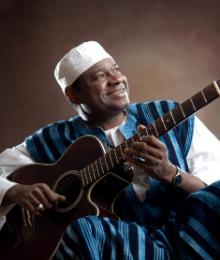
Nakany Kanté is a Guinean singer and songwriter born in 1992 in Siguiri, who has built her musical career between Africa and Catalonia. Coming from the Malinké ethnic group and having experienced a childhood marked by hardship, she has established herself as a committed and versatile artist, creating a unique musical style that she calls "Mandingo Afropop."
Based in Barcelona since 2009, Nakany has developed a musical approach that blends African traditions with contemporary sounds. Her songs tackle powerful social issues such as child abandonment, gender inequality, and the migrant experience. Her albums — Saramaya (2014), Naka (2016), and From Conakry to Barcelona (2020) — reflect her artistic and personal journey, performed mainly in Malinké, Susu, and Wolof, carrying messages of resilience and cultural openness.
Nakany Kanté is more than just a musician; she is a storyteller, an activist artist who uses music as a bridge between cultures and as a tool for social transformation.
Origins and Childhood
Born in 1992 in Siguiri, a town near the Malian border, Nakany Kanté comes from the Malinké ethnic group, a culture rich in musical traditions. Her childhood was marked by hardship, accompanying her mother who begged on the streets of her hometown. Despite the difficulties, music already served as an escape and a source of joy for young Nakany, who sang and danced naturally in local languages: Malinké and Susu.
Journey and Migration
At the age of 12, Nakany moved to Conakry, the capital of Guinea, where her life took a decisive turn. It was in this city that she met Daniel Aguilar, a percussionist from Sabadell, Spain, who would become her husband and musical partner. Although she began composing music at the age of eight, it was truly after her relocation to Catalonia in 2009 that her artistic talent began to flourish.
Artistic Emergence in Barcelona
Arriving in Barcelona marked a pivotal moment in Nakany's emerging musical career. The city's rich cultural diversity quickly became fertile ground for her artistic development. She passionately immersed herself in the local African music scene, forging significant connections with several emblematic groups that helped shape her musical journey.
Among her notable collaborations was Kenkeliba, a group representing West African music based in Barcelona. She also worked closely with Banan Kaló, an ensemble specializing in Wassoulou music, which enriched her repertoire and deepened her understanding of African musical traditions. These interactions enabled her to build valuable connections with talented artists like Adiaratou Diabaté and Koungbana Condé.
A decisive turning point came in 2011 with her participation in the Afroesfera project, an ambitious initiative aimed at promoting and valuing African artists in Catalonia. This opportunity provided Nakany with crucial visibility, allowing her to expand her artistic network and gain recognition within Barcelona’s musical landscape. This experience solidified her emerging position and paved the way for a career with promising reach.
Discography and Musical Style
Nakany Kanté stands out in the music scene with a distinctive style best described as Mandingue Afropop. This unique approach reflects her multicultural journey, blending the musical traditions of her Guinean heritage with her experiences in Barcelona. Her music thus becomes a bridge between cultures, carrying the listener through deeply personal yet universally relatable narratives.
Her discography testifies to this rich and meaningful artistic journey. Her debut album, Saramaya, released in 2014, meaning "success" in Malinké, marked her promising beginning. It is more than just a musical project—it's a declaration of intent, an affirmation of her artistic identity. Two years later, Naka (2016) delved deeper into this approach, offering an introspective journey that explored her roots and personal experiences with remarkable sensitivity.
Her third album, De Conakry à Barcelone (2020), is arguably the most emblematic work of her career. This project symbolizes her migratory journey, transforming her personal experience into a universal narrative of migration, resilience, and transformation. Each note and melody tells a fragment of her story, inviting the listener to grasp the complexity and beauty of migratory experiences through an artistic expression that is both authentic and moving.
Themes and Social Engagement
Nakany Kanté’s music goes beyond mere artistic entertainment; it becomes a powerful tool for social awareness. Her compositions serve as potent narratives that give voice to the often unseen realities of marginalized communities, especially those shaped by African and migratory experiences.
The plight of abandoned children occupies a central place in her work. Through her lyrics, Nakany sheds light on the vulnerability of these children, denouncing the social systems that leave them unprotected and without prospects. She transforms this painful reality into a call for collective responsibility, inviting her audience to rethink the social structures that create these distressing situations.
Nakany's feminist commitment is particularly evident in her fight against gender inequality. Her songs challenge traditional patriarchal norms by valuing women's autonomy and empowerment. She shares stories of resilience, illustrating how African women can transcend cultural and social constraints to assert their freedom and dignity.
The migratory experience is a central thread in her work. She not only describes the difficulties of uprooting but also offers a nuanced perspective on migration. Her compositions reveal the challenges—administrative, psychological, cultural—while also highlighting the opportunities for personal transformation that migration represents. She humanizes an experience too often reduced to statistics or political discourse.
Finally, the preservation of African traditions appears as an act of cultural resistance. For Nakany, music becomes a means of transmission, a space where oral traditions, ancestral rhythms, and languages like Malinké can continue to live and thrive, resisting assimilation pressures. Each song becomes a living heritage, a bridge between generations and territories.
Recognition and Influence
Nakany Kanté’s artistic journey is marked by growing recognition that transcends geographical and cultural boundaries. In Spain, she has established herself as a significant figure in the world music scene, with notable performances at prestigious events such as the Black Music Festival in Girona in 2019 and the Mercat de Música Viva de Vic in 2020, showcasing her unique talent and ability to connect different musical worlds.
Her artistic visibility further expanded through participation in documentary projects, notably one dedicated to Idrissa Diallo, demonstrating that her artistic commitment extends beyond music to serve as an act of memory and social testimony.
This recognition in both Spain and Guinea reflects her ability to create universal music that deeply resonates with diverse audiences, establishing her as more than just an artist—she is a cultural ambassador capable of bridging communities and experiences.
Influences and Inspiration
Nakany Kanté draws musical inspiration from the great African artists who have revolutionized global music.
Salif Keïta, the "albino king of Mandingue music," serves as a major reference for his ability to modernize West African musical traditions. Fatoumata Diawara, known for her socially engaged music and her journey as an independent female artist, resonates with Nakany's artistic vision. Angélique Kidjo, a symbol of African music's global reach and a voice for universal social issues, also deeply influences her.
These artists not only share a common geographical heritage but also view music as a tool for social change, intercultural dialogue, and identity affirmation—principles that permeate and enrich Nakany Kanté's work.
Artistic Philosophy
For Nakany, music is more than an art form—it's a way to build bridges between cultures, tell stories, and give voice to the unheard. "When I sing, I build my world," she says.
Conclusion
Nakany Kanté represents a new generation of African artists—deeply rooted in their traditions yet open to the world. Her journey is a testament to resilience, creativity, and cultural openness.
An artist to watch, she continues to enrich the global music scene with her unique voice and inspiring story.

























